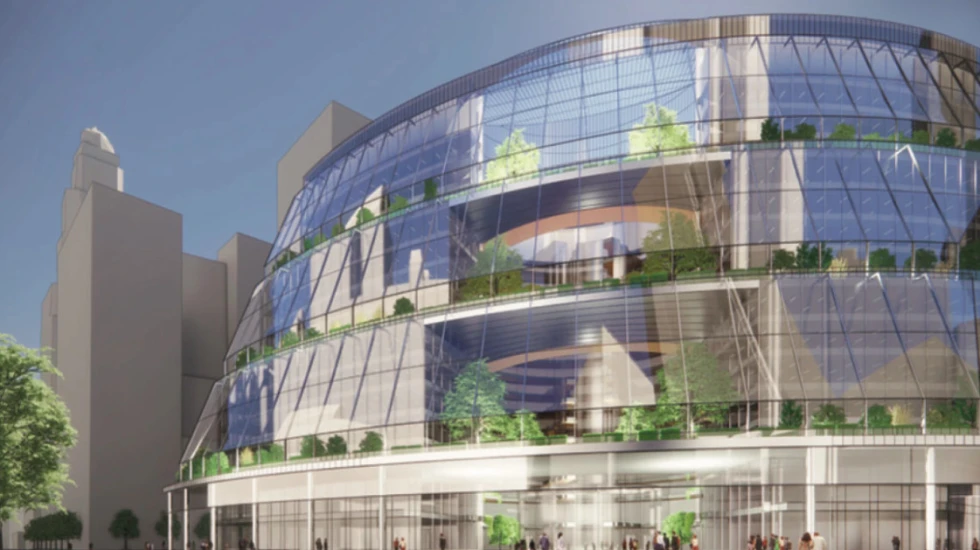
Back in December, Gov. J.B. Pritzker executed a spin move that would have scored well in an Olympic competition for policy shifts.
After months of talking down the prospects for the state-owned Thompson Center in the Loop, suggesting it was good for nothing but a teardown, he accepted a proposal to not only save the building but for the state to still own about 30% of it.
Preservationists loved the move, as did those who, regardless of how they viewed the architecture, liked the sustainability of using what’s already there. The deal got the state out of a financial tangle. And it promises a shot in the arm for a part of the Loop that needs it — provided that Pritzker’s chosen developer, Michael Reschke, can pull off his end of the bargain.
Chicago Enterprise
The Thompson Center is a critical piece of the central Loop, that part of the main business district that centers on La Salle Street, long the city’s financial hub. La Salle is full of distinguished buildings, with the street seeming to cut through cliffs of limestone and terra cotta that stop at the Chicago Board of Trade Building at Jackson Boulevard. It’s a classic urban vista.
But it’s facing capitalism’s version of climate change. Business anchors such as BMO Harris and Bank of America are moving elsewhere downtown, drawn to high-rise views and naming rights on buildings.
Financial exchanges don’t draw physical crowds of traders anymore. And some regard the office space as too outmoded for today’s needs. Sources say the vacancy rate around La Salle Street is 20% or more for both offices and retail.
The Thompson Center, occupying the full block at La Salle, Clark, Randolph and Lake streets, threatened to deaden the area further. Pritzker’s pirouette kept it from sitting empty. Reschke, chairman of Prime Group, insists the building, costing him $70 million to buy but much more to fix up, can lead a La Salle revival.
“We’ve been getting a lot of interest in this building. We are very excited about its prospects,” he said last week.
He’s had time to analyze what he agreed to purchase. Reschke said he hopes to close on the sale with the state this summer and to start the expensive overhaul in the fall. His remarks betray no buyer’s remorse.
“People are starting to realize the benefits of a central Loop location again,” he said. Those would include superior transit access. The building itself is the L’s hub, with six transit lines stopping there.

Reschke drew a contrast with Fulton Market, which is booming but by some accounts is feeling the effects in more traffic congestion, even without workplaces back at full usage. Fulton Market also is still a niche —Jones Lang La Salle reports it has 7 million square feet for offices compared with about 36 million square feet in the central Loop.
The trendiness factor gives Fulton Market a lock on high rents. The JLL data shows its market average is about $56 per square foot, more than $15 greater than what applies in the central Loop where landlords are cutting deals.
Reschke said when businesses shop for space, “it’s really not so much about [rental] rate, believe it or not. It’s the intangibles, the transit, the air purification systems. Employers are more concerned about conveniences and amenities, anything that makes for a cool, nice environment.”
Reschke declined to discuss updates to his Thompson Center plan, saying he’s a few weeks away from that point. He said one option, a hotel, has been ruled out.
So he’ll be trying to lease about 800,000 square feet in a building slated to get a new glass curtain wall to better regulate its temperatures. The state is due to take another 425,000 square feet. Reschke is working with Jahn Architecture, the firm started by the building’s late designer, Helmut Jahn.
Mary Ludgin, senior managing director at the real estate firm Heitman, said Reschke can offer large floor layouts typically not found along La Salle and could attract a tech user to make other companies look anew at the central Loop.
She’s been thinking about the issue because a panel she chaired will present recommendations on March 22 for improving La Salle. It’s a program organized by the Urban Land Institute Chicago.
“There is a future for offices” in the corridor, she said. But La Salle will need more residences and retail on or near the street, she said. One recommendation is for less space for cars and more for pedestrians and greenery. It’s about creating more activity night and day.
“La Salle Street’s future is as a mixed-use district. Now, it’s a monoculture, and that doesn’t work in today’s environment,” Ludgin said.
Sometimes, all it takes is one flashy project to make an area fashionable again. People love or hate the Thompson Center, but if it powers the central Loop’s turnaround, it will have earned the right to be called a landmark.







